Leadership, Management, and Operations at Next: A Comprehensive Report
VerifiedAdded on 2023/01/11
|9
|2924
|92
Report
AI Summary
This report provides a comprehensive analysis of leadership, management, and operational strategies within the context of the Next company. It begins by defining management and operations, highlighting their roles in achieving organizational goals and facilitating smooth business operations. The report delves into the roles of leaders and managers, contrasting their approaches in various situations, such as adapting to change and reducing employee turnover. It then explores various leadership theories, including situational, contingency, and system leadership, critically evaluating their advantages and disadvantages. The report also examines key approaches to operation management, such as Total Quality Management (TQM), Six Sigma, and Just in Time, emphasizing their importance in optimizing resource utilization and ensuring quality. Furthermore, it discusses the impact of the business environment, including political, economic, social, technological, legal, and environmental factors, on operational management. Overall, the report offers a detailed overview of leadership and management practices, providing valuable insights for understanding organizational success.
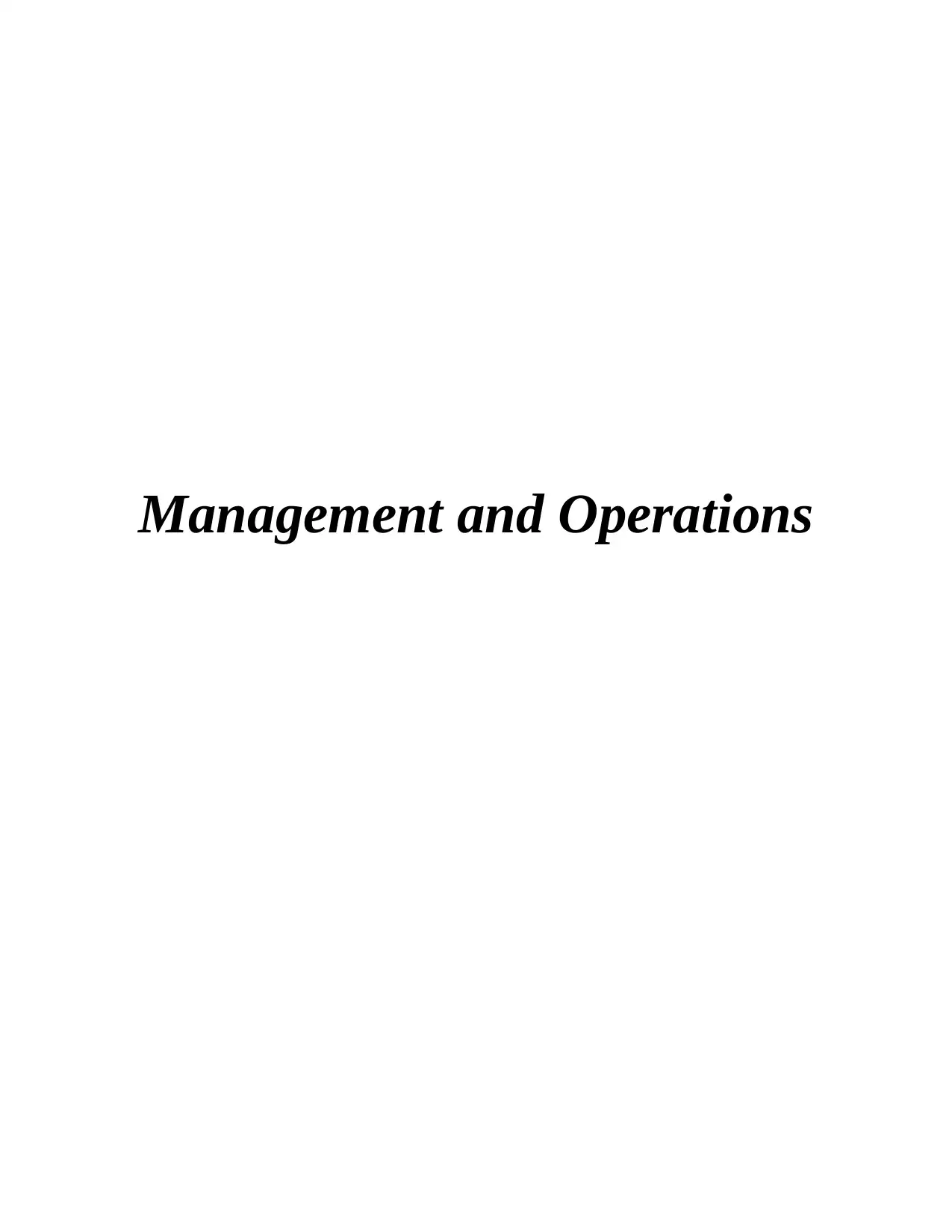
Management and Operations
Paraphrase This Document
Need a fresh take? Get an instant paraphrase of this document with our AI Paraphraser
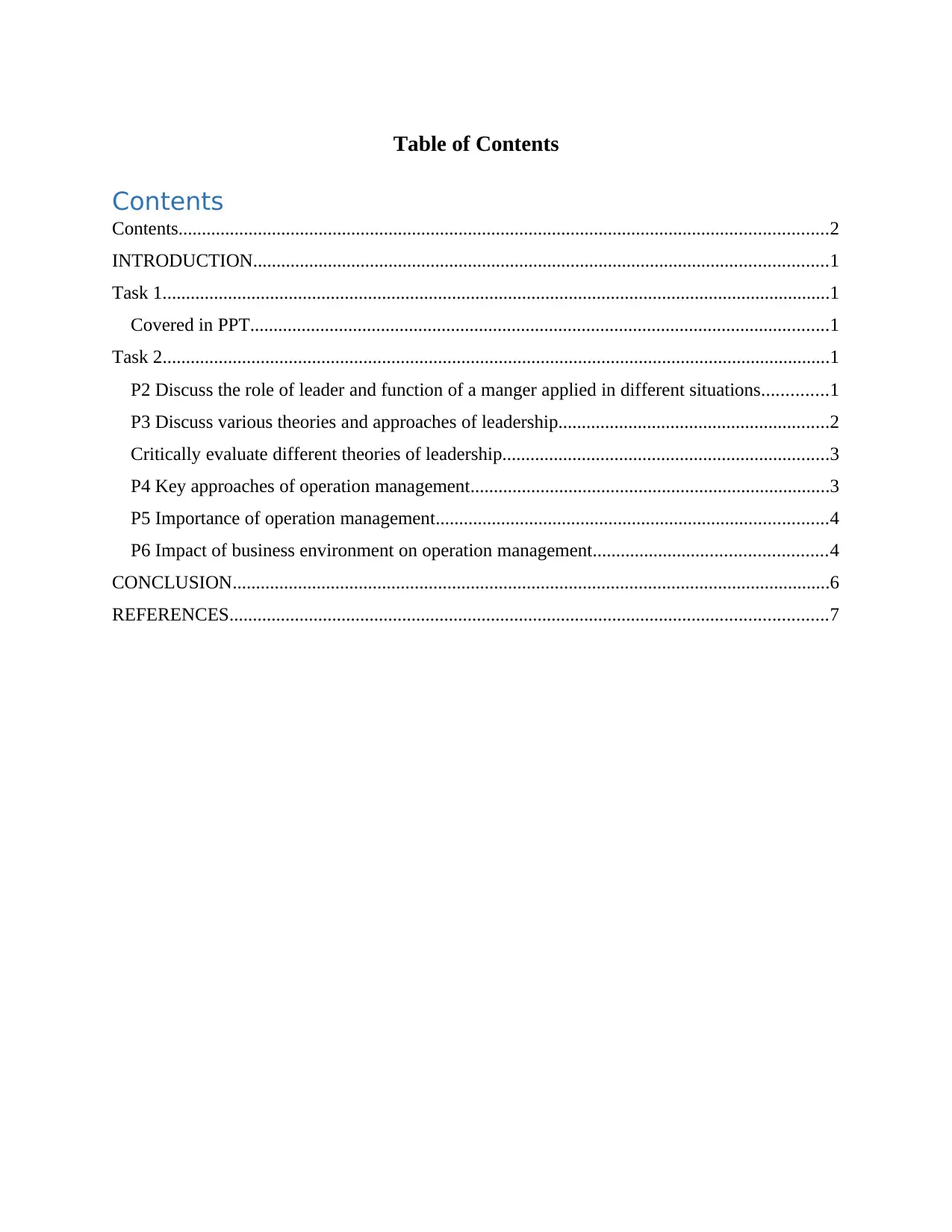
Table of Contents
Contents
Contents...........................................................................................................................................2
INTRODUCTION...........................................................................................................................1
Task 1...............................................................................................................................................1
Covered in PPT............................................................................................................................1
Task 2...............................................................................................................................................1
P2 Discuss the role of leader and function of a manger applied in different situations..............1
P3 Discuss various theories and approaches of leadership..........................................................2
Critically evaluate different theories of leadership......................................................................3
P4 Key approaches of operation management.............................................................................3
P5 Importance of operation management....................................................................................4
P6 Impact of business environment on operation management..................................................4
CONCLUSION................................................................................................................................6
REFERENCES................................................................................................................................7
Contents
Contents...........................................................................................................................................2
INTRODUCTION...........................................................................................................................1
Task 1...............................................................................................................................................1
Covered in PPT............................................................................................................................1
Task 2...............................................................................................................................................1
P2 Discuss the role of leader and function of a manger applied in different situations..............1
P3 Discuss various theories and approaches of leadership..........................................................2
Critically evaluate different theories of leadership......................................................................3
P4 Key approaches of operation management.............................................................................3
P5 Importance of operation management....................................................................................4
P6 Impact of business environment on operation management..................................................4
CONCLUSION................................................................................................................................6
REFERENCES................................................................................................................................7
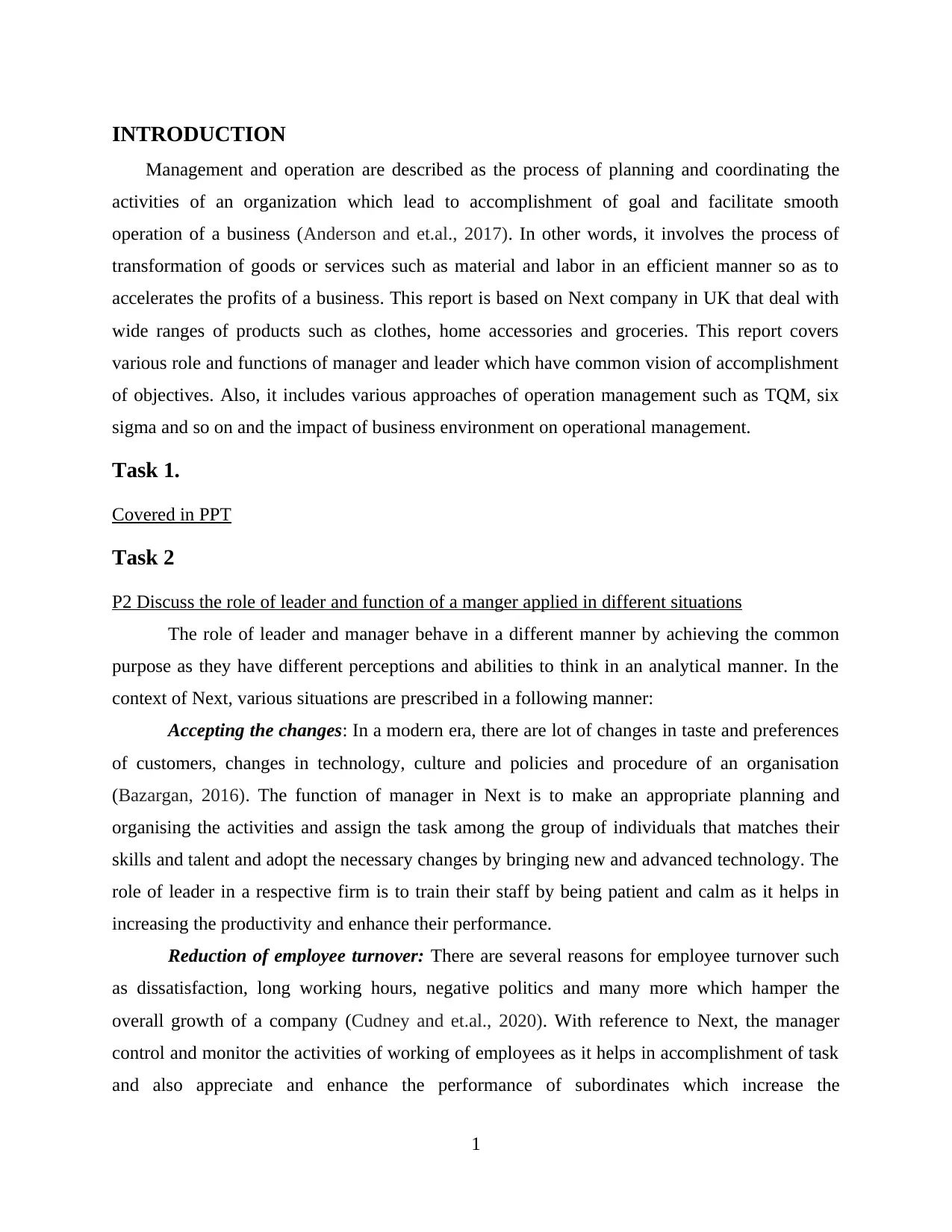
INTRODUCTION
Management and operation are described as the process of planning and coordinating the
activities of an organization which lead to accomplishment of goal and facilitate smooth
operation of a business (Anderson and et.al., 2017). In other words, it involves the process of
transformation of goods or services such as material and labor in an efficient manner so as to
accelerates the profits of a business. This report is based on Next company in UK that deal with
wide ranges of products such as clothes, home accessories and groceries. This report covers
various role and functions of manager and leader which have common vision of accomplishment
of objectives. Also, it includes various approaches of operation management such as TQM, six
sigma and so on and the impact of business environment on operational management.
Task 1.
Covered in PPT
Task 2
P2 Discuss the role of leader and function of a manger applied in different situations
The role of leader and manager behave in a different manner by achieving the common
purpose as they have different perceptions and abilities to think in an analytical manner. In the
context of Next, various situations are prescribed in a following manner:
Accepting the changes: In a modern era, there are lot of changes in taste and preferences
of customers, changes in technology, culture and policies and procedure of an organisation
(Bazargan, 2016). The function of manager in Next is to make an appropriate planning and
organising the activities and assign the task among the group of individuals that matches their
skills and talent and adopt the necessary changes by bringing new and advanced technology. The
role of leader in a respective firm is to train their staff by being patient and calm as it helps in
increasing the productivity and enhance their performance.
Reduction of employee turnover: There are several reasons for employee turnover such
as dissatisfaction, long working hours, negative politics and many more which hamper the
overall growth of a company (Cudney and et.al., 2020). With reference to Next, the manager
control and monitor the activities of working of employees as it helps in accomplishment of task
and also appreciate and enhance the performance of subordinates which increase the
1
Management and operation are described as the process of planning and coordinating the
activities of an organization which lead to accomplishment of goal and facilitate smooth
operation of a business (Anderson and et.al., 2017). In other words, it involves the process of
transformation of goods or services such as material and labor in an efficient manner so as to
accelerates the profits of a business. This report is based on Next company in UK that deal with
wide ranges of products such as clothes, home accessories and groceries. This report covers
various role and functions of manager and leader which have common vision of accomplishment
of objectives. Also, it includes various approaches of operation management such as TQM, six
sigma and so on and the impact of business environment on operational management.
Task 1.
Covered in PPT
Task 2
P2 Discuss the role of leader and function of a manger applied in different situations
The role of leader and manager behave in a different manner by achieving the common
purpose as they have different perceptions and abilities to think in an analytical manner. In the
context of Next, various situations are prescribed in a following manner:
Accepting the changes: In a modern era, there are lot of changes in taste and preferences
of customers, changes in technology, culture and policies and procedure of an organisation
(Bazargan, 2016). The function of manager in Next is to make an appropriate planning and
organising the activities and assign the task among the group of individuals that matches their
skills and talent and adopt the necessary changes by bringing new and advanced technology. The
role of leader in a respective firm is to train their staff by being patient and calm as it helps in
increasing the productivity and enhance their performance.
Reduction of employee turnover: There are several reasons for employee turnover such
as dissatisfaction, long working hours, negative politics and many more which hamper the
overall growth of a company (Cudney and et.al., 2020). With reference to Next, the manager
control and monitor the activities of working of employees as it helps in accomplishment of task
and also appreciate and enhance the performance of subordinates which increase the
1
⊘ This is a preview!⊘
Do you want full access?
Subscribe today to unlock all pages.

Trusted by 1+ million students worldwide
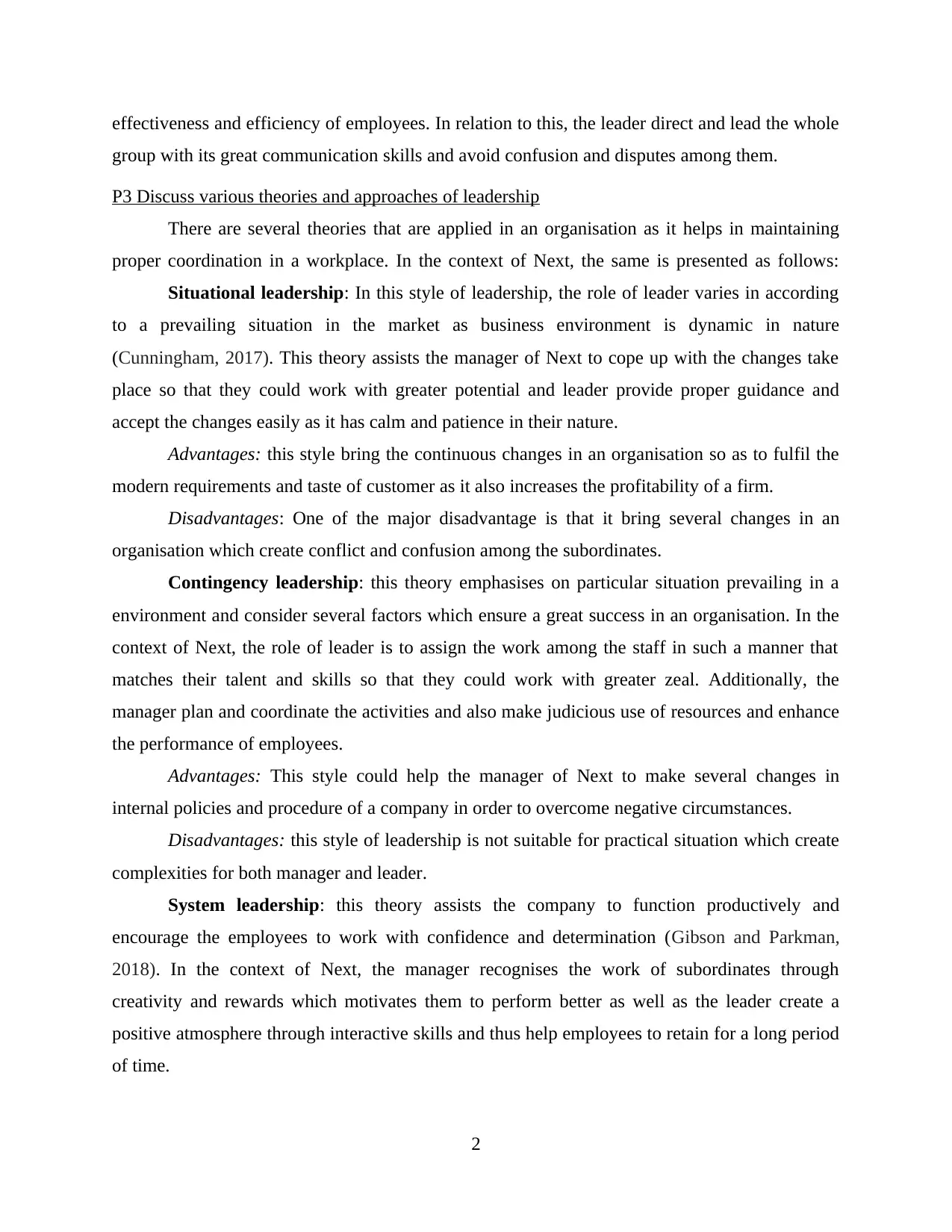
effectiveness and efficiency of employees. In relation to this, the leader direct and lead the whole
group with its great communication skills and avoid confusion and disputes among them.
P3 Discuss various theories and approaches of leadership
There are several theories that are applied in an organisation as it helps in maintaining
proper coordination in a workplace. In the context of Next, the same is presented as follows:
Situational leadership: In this style of leadership, the role of leader varies in according
to a prevailing situation in the market as business environment is dynamic in nature
(Cunningham, 2017). This theory assists the manager of Next to cope up with the changes take
place so that they could work with greater potential and leader provide proper guidance and
accept the changes easily as it has calm and patience in their nature.
Advantages: this style bring the continuous changes in an organisation so as to fulfil the
modern requirements and taste of customer as it also increases the profitability of a firm.
Disadvantages: One of the major disadvantage is that it bring several changes in an
organisation which create conflict and confusion among the subordinates.
Contingency leadership: this theory emphasises on particular situation prevailing in a
environment and consider several factors which ensure a great success in an organisation. In the
context of Next, the role of leader is to assign the work among the staff in such a manner that
matches their talent and skills so that they could work with greater zeal. Additionally, the
manager plan and coordinate the activities and also make judicious use of resources and enhance
the performance of employees.
Advantages: This style could help the manager of Next to make several changes in
internal policies and procedure of a company in order to overcome negative circumstances.
Disadvantages: this style of leadership is not suitable for practical situation which create
complexities for both manager and leader.
System leadership: this theory assists the company to function productively and
encourage the employees to work with confidence and determination (Gibson and Parkman,
2018). In the context of Next, the manager recognises the work of subordinates through
creativity and rewards which motivates them to perform better as well as the leader create a
positive atmosphere through interactive skills and thus help employees to retain for a long period
of time.
2
group with its great communication skills and avoid confusion and disputes among them.
P3 Discuss various theories and approaches of leadership
There are several theories that are applied in an organisation as it helps in maintaining
proper coordination in a workplace. In the context of Next, the same is presented as follows:
Situational leadership: In this style of leadership, the role of leader varies in according
to a prevailing situation in the market as business environment is dynamic in nature
(Cunningham, 2017). This theory assists the manager of Next to cope up with the changes take
place so that they could work with greater potential and leader provide proper guidance and
accept the changes easily as it has calm and patience in their nature.
Advantages: this style bring the continuous changes in an organisation so as to fulfil the
modern requirements and taste of customer as it also increases the profitability of a firm.
Disadvantages: One of the major disadvantage is that it bring several changes in an
organisation which create conflict and confusion among the subordinates.
Contingency leadership: this theory emphasises on particular situation prevailing in a
environment and consider several factors which ensure a great success in an organisation. In the
context of Next, the role of leader is to assign the work among the staff in such a manner that
matches their talent and skills so that they could work with greater zeal. Additionally, the
manager plan and coordinate the activities and also make judicious use of resources and enhance
the performance of employees.
Advantages: This style could help the manager of Next to make several changes in
internal policies and procedure of a company in order to overcome negative circumstances.
Disadvantages: this style of leadership is not suitable for practical situation which create
complexities for both manager and leader.
System leadership: this theory assists the company to function productively and
encourage the employees to work with confidence and determination (Gibson and Parkman,
2018). In the context of Next, the manager recognises the work of subordinates through
creativity and rewards which motivates them to perform better as well as the leader create a
positive atmosphere through interactive skills and thus help employees to retain for a long period
of time.
2
Paraphrase This Document
Need a fresh take? Get an instant paraphrase of this document with our AI Paraphraser
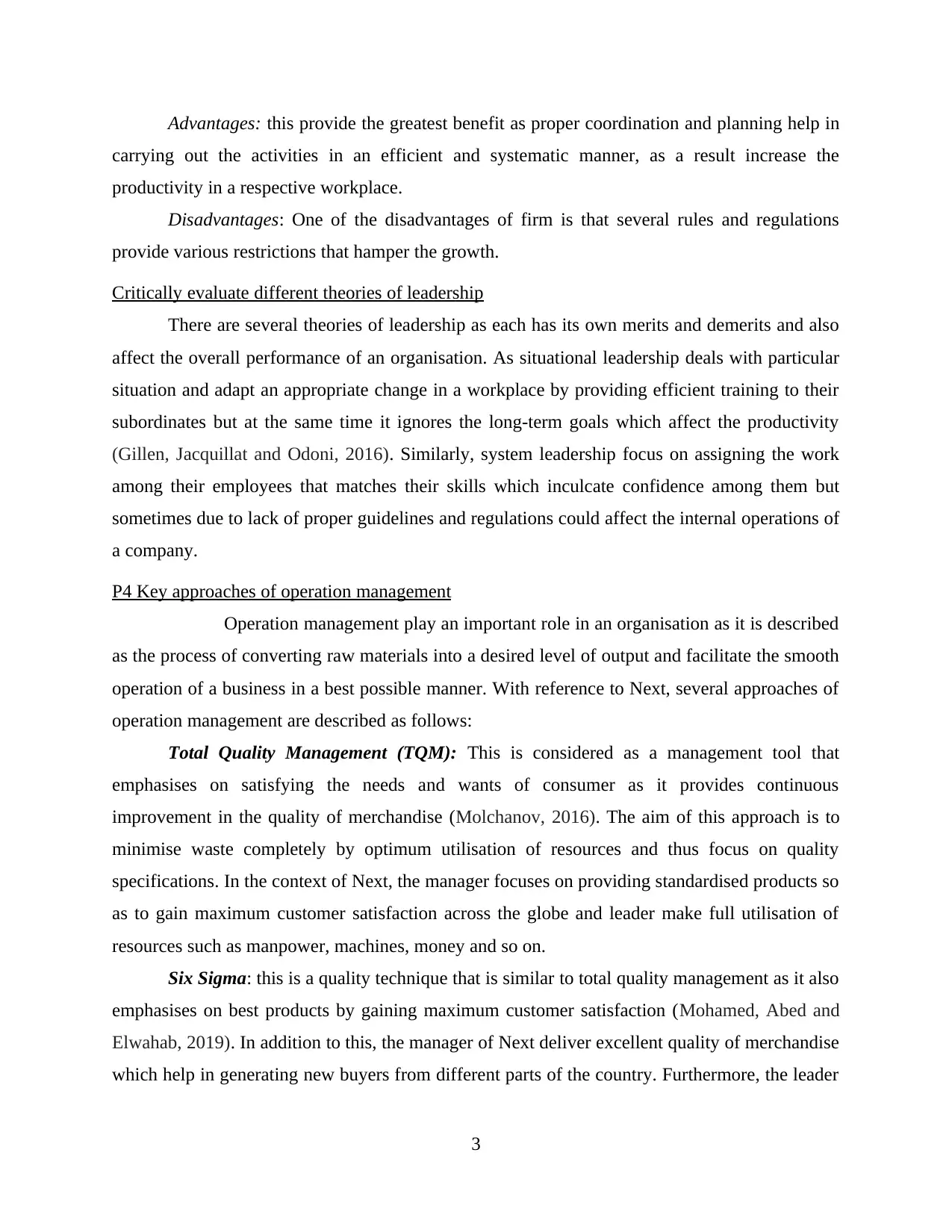
Advantages: this provide the greatest benefit as proper coordination and planning help in
carrying out the activities in an efficient and systematic manner, as a result increase the
productivity in a respective workplace.
Disadvantages: One of the disadvantages of firm is that several rules and regulations
provide various restrictions that hamper the growth.
Critically evaluate different theories of leadership
There are several theories of leadership as each has its own merits and demerits and also
affect the overall performance of an organisation. As situational leadership deals with particular
situation and adapt an appropriate change in a workplace by providing efficient training to their
subordinates but at the same time it ignores the long-term goals which affect the productivity
(Gillen, Jacquillat and Odoni, 2016). Similarly, system leadership focus on assigning the work
among their employees that matches their skills which inculcate confidence among them but
sometimes due to lack of proper guidelines and regulations could affect the internal operations of
a company.
P4 Key approaches of operation management
Operation management play an important role in an organisation as it is described
as the process of converting raw materials into a desired level of output and facilitate the smooth
operation of a business in a best possible manner. With reference to Next, several approaches of
operation management are described as follows:
Total Quality Management (TQM): This is considered as a management tool that
emphasises on satisfying the needs and wants of consumer as it provides continuous
improvement in the quality of merchandise (Molchanov, 2016). The aim of this approach is to
minimise waste completely by optimum utilisation of resources and thus focus on quality
specifications. In the context of Next, the manager focuses on providing standardised products so
as to gain maximum customer satisfaction across the globe and leader make full utilisation of
resources such as manpower, machines, money and so on.
Six Sigma: this is a quality technique that is similar to total quality management as it also
emphasises on best products by gaining maximum customer satisfaction (Mohamed, Abed and
Elwahab, 2019). In addition to this, the manager of Next deliver excellent quality of merchandise
which help in generating new buyers from different parts of the country. Furthermore, the leader
3
carrying out the activities in an efficient and systematic manner, as a result increase the
productivity in a respective workplace.
Disadvantages: One of the disadvantages of firm is that several rules and regulations
provide various restrictions that hamper the growth.
Critically evaluate different theories of leadership
There are several theories of leadership as each has its own merits and demerits and also
affect the overall performance of an organisation. As situational leadership deals with particular
situation and adapt an appropriate change in a workplace by providing efficient training to their
subordinates but at the same time it ignores the long-term goals which affect the productivity
(Gillen, Jacquillat and Odoni, 2016). Similarly, system leadership focus on assigning the work
among their employees that matches their skills which inculcate confidence among them but
sometimes due to lack of proper guidelines and regulations could affect the internal operations of
a company.
P4 Key approaches of operation management
Operation management play an important role in an organisation as it is described
as the process of converting raw materials into a desired level of output and facilitate the smooth
operation of a business in a best possible manner. With reference to Next, several approaches of
operation management are described as follows:
Total Quality Management (TQM): This is considered as a management tool that
emphasises on satisfying the needs and wants of consumer as it provides continuous
improvement in the quality of merchandise (Molchanov, 2016). The aim of this approach is to
minimise waste completely by optimum utilisation of resources and thus focus on quality
specifications. In the context of Next, the manager focuses on providing standardised products so
as to gain maximum customer satisfaction across the globe and leader make full utilisation of
resources such as manpower, machines, money and so on.
Six Sigma: this is a quality technique that is similar to total quality management as it also
emphasises on best products by gaining maximum customer satisfaction (Mohamed, Abed and
Elwahab, 2019). In addition to this, the manager of Next deliver excellent quality of merchandise
which help in generating new buyers from different parts of the country. Furthermore, the leader
3
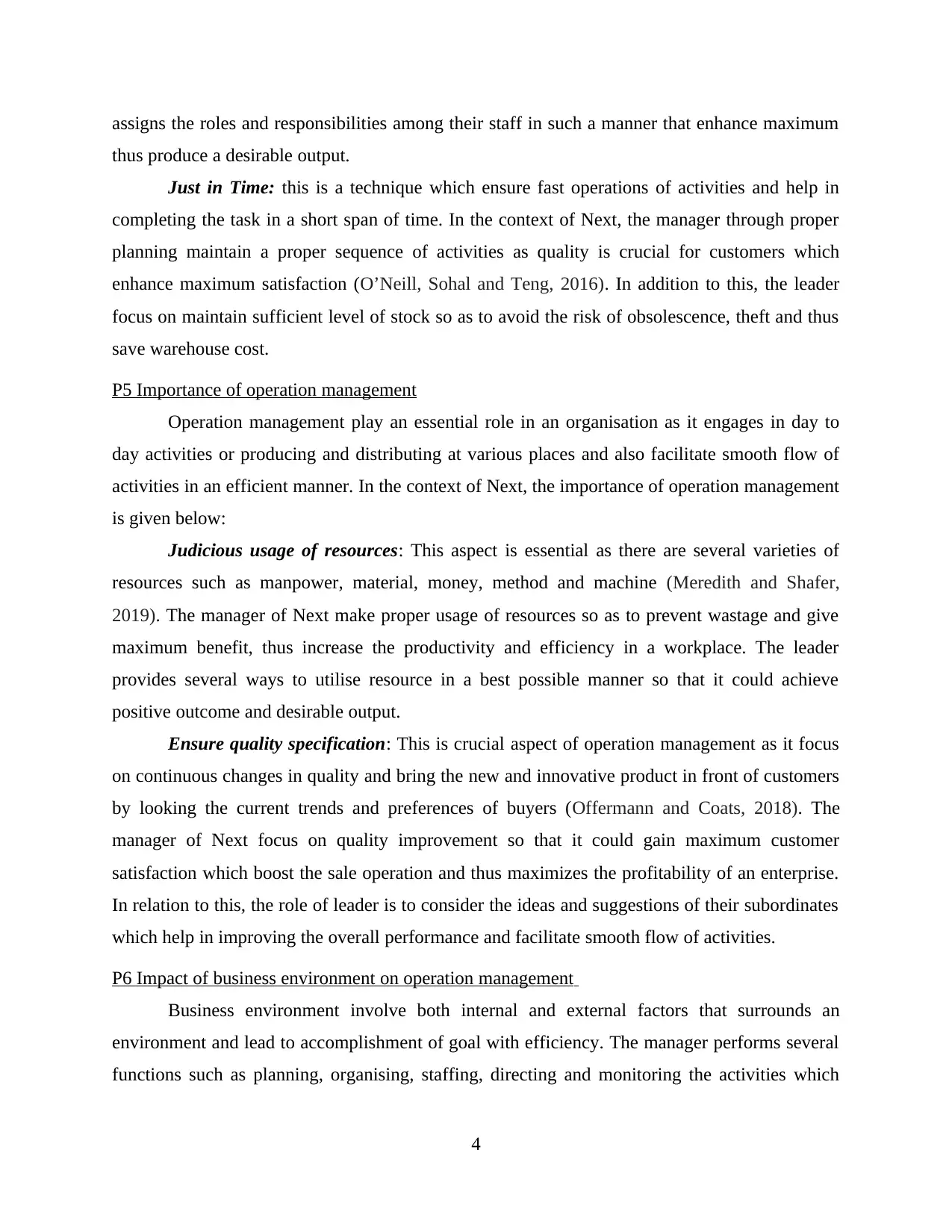
assigns the roles and responsibilities among their staff in such a manner that enhance maximum
thus produce a desirable output.
Just in Time: this is a technique which ensure fast operations of activities and help in
completing the task in a short span of time. In the context of Next, the manager through proper
planning maintain a proper sequence of activities as quality is crucial for customers which
enhance maximum satisfaction (O’Neill, Sohal and Teng, 2016). In addition to this, the leader
focus on maintain sufficient level of stock so as to avoid the risk of obsolescence, theft and thus
save warehouse cost.
P5 Importance of operation management
Operation management play an essential role in an organisation as it engages in day to
day activities or producing and distributing at various places and also facilitate smooth flow of
activities in an efficient manner. In the context of Next, the importance of operation management
is given below:
Judicious usage of resources: This aspect is essential as there are several varieties of
resources such as manpower, material, money, method and machine (Meredith and Shafer,
2019). The manager of Next make proper usage of resources so as to prevent wastage and give
maximum benefit, thus increase the productivity and efficiency in a workplace. The leader
provides several ways to utilise resource in a best possible manner so that it could achieve
positive outcome and desirable output.
Ensure quality specification: This is crucial aspect of operation management as it focus
on continuous changes in quality and bring the new and innovative product in front of customers
by looking the current trends and preferences of buyers (Offermann and Coats, 2018). The
manager of Next focus on quality improvement so that it could gain maximum customer
satisfaction which boost the sale operation and thus maximizes the profitability of an enterprise.
In relation to this, the role of leader is to consider the ideas and suggestions of their subordinates
which help in improving the overall performance and facilitate smooth flow of activities.
P6 Impact of business environment on operation management
Business environment involve both internal and external factors that surrounds an
environment and lead to accomplishment of goal with efficiency. The manager performs several
functions such as planning, organising, staffing, directing and monitoring the activities which
4
thus produce a desirable output.
Just in Time: this is a technique which ensure fast operations of activities and help in
completing the task in a short span of time. In the context of Next, the manager through proper
planning maintain a proper sequence of activities as quality is crucial for customers which
enhance maximum satisfaction (O’Neill, Sohal and Teng, 2016). In addition to this, the leader
focus on maintain sufficient level of stock so as to avoid the risk of obsolescence, theft and thus
save warehouse cost.
P5 Importance of operation management
Operation management play an essential role in an organisation as it engages in day to
day activities or producing and distributing at various places and also facilitate smooth flow of
activities in an efficient manner. In the context of Next, the importance of operation management
is given below:
Judicious usage of resources: This aspect is essential as there are several varieties of
resources such as manpower, material, money, method and machine (Meredith and Shafer,
2019). The manager of Next make proper usage of resources so as to prevent wastage and give
maximum benefit, thus increase the productivity and efficiency in a workplace. The leader
provides several ways to utilise resource in a best possible manner so that it could achieve
positive outcome and desirable output.
Ensure quality specification: This is crucial aspect of operation management as it focus
on continuous changes in quality and bring the new and innovative product in front of customers
by looking the current trends and preferences of buyers (Offermann and Coats, 2018). The
manager of Next focus on quality improvement so that it could gain maximum customer
satisfaction which boost the sale operation and thus maximizes the profitability of an enterprise.
In relation to this, the role of leader is to consider the ideas and suggestions of their subordinates
which help in improving the overall performance and facilitate smooth flow of activities.
P6 Impact of business environment on operation management
Business environment involve both internal and external factors that surrounds an
environment and lead to accomplishment of goal with efficiency. The manager performs several
functions such as planning, organising, staffing, directing and monitoring the activities which
4
⊘ This is a preview!⊘
Do you want full access?
Subscribe today to unlock all pages.

Trusted by 1+ million students worldwide
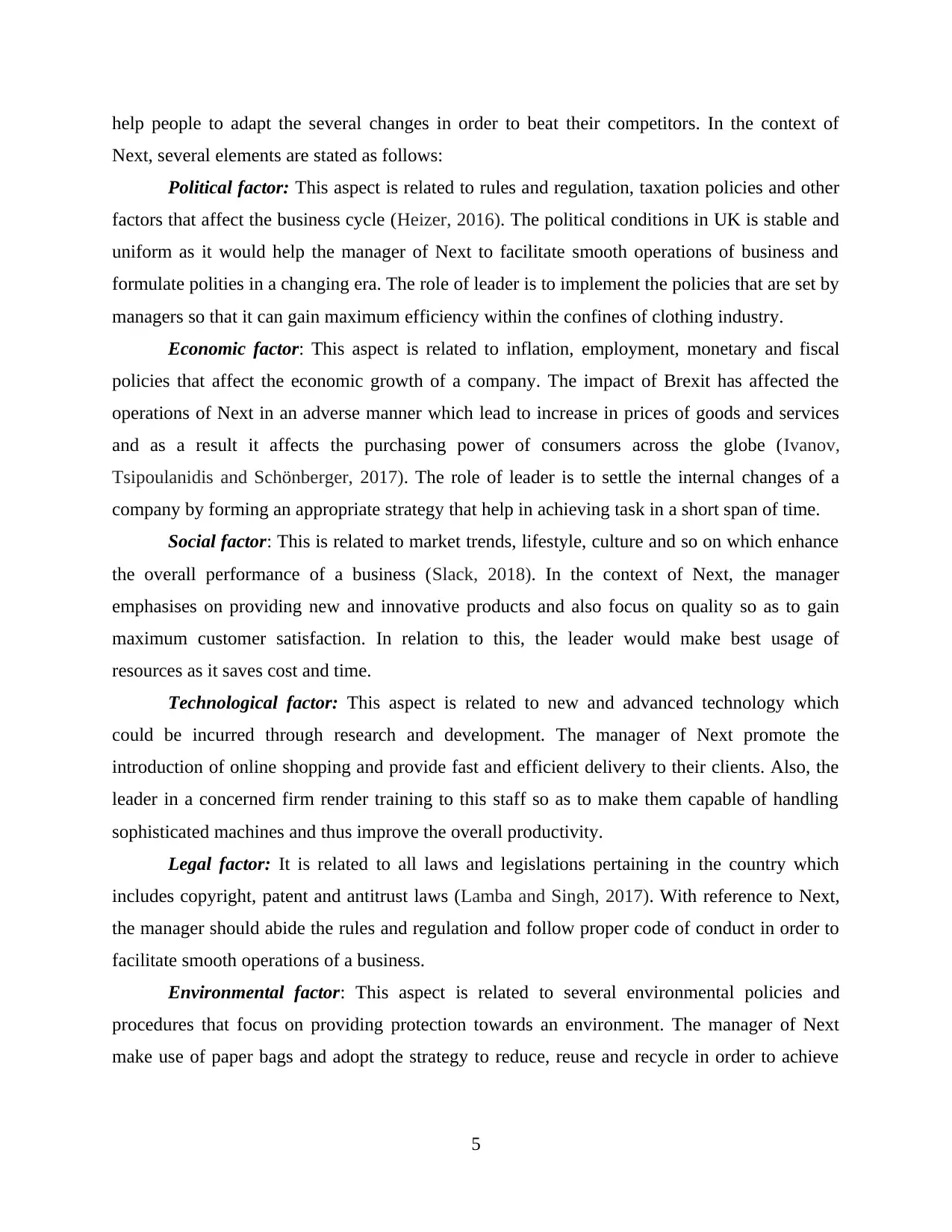
help people to adapt the several changes in order to beat their competitors. In the context of
Next, several elements are stated as follows:
Political factor: This aspect is related to rules and regulation, taxation policies and other
factors that affect the business cycle (Heizer, 2016). The political conditions in UK is stable and
uniform as it would help the manager of Next to facilitate smooth operations of business and
formulate polities in a changing era. The role of leader is to implement the policies that are set by
managers so that it can gain maximum efficiency within the confines of clothing industry.
Economic factor: This aspect is related to inflation, employment, monetary and fiscal
policies that affect the economic growth of a company. The impact of Brexit has affected the
operations of Next in an adverse manner which lead to increase in prices of goods and services
and as a result it affects the purchasing power of consumers across the globe (Ivanov,
Tsipoulanidis and Schönberger, 2017). The role of leader is to settle the internal changes of a
company by forming an appropriate strategy that help in achieving task in a short span of time.
Social factor: This is related to market trends, lifestyle, culture and so on which enhance
the overall performance of a business (Slack, 2018). In the context of Next, the manager
emphasises on providing new and innovative products and also focus on quality so as to gain
maximum customer satisfaction. In relation to this, the leader would make best usage of
resources as it saves cost and time.
Technological factor: This aspect is related to new and advanced technology which
could be incurred through research and development. The manager of Next promote the
introduction of online shopping and provide fast and efficient delivery to their clients. Also, the
leader in a concerned firm render training to this staff so as to make them capable of handling
sophisticated machines and thus improve the overall productivity.
Legal factor: It is related to all laws and legislations pertaining in the country which
includes copyright, patent and antitrust laws (Lamba and Singh, 2017). With reference to Next,
the manager should abide the rules and regulation and follow proper code of conduct in order to
facilitate smooth operations of a business.
Environmental factor: This aspect is related to several environmental policies and
procedures that focus on providing protection towards an environment. The manager of Next
make use of paper bags and adopt the strategy to reduce, reuse and recycle in order to achieve
5
Next, several elements are stated as follows:
Political factor: This aspect is related to rules and regulation, taxation policies and other
factors that affect the business cycle (Heizer, 2016). The political conditions in UK is stable and
uniform as it would help the manager of Next to facilitate smooth operations of business and
formulate polities in a changing era. The role of leader is to implement the policies that are set by
managers so that it can gain maximum efficiency within the confines of clothing industry.
Economic factor: This aspect is related to inflation, employment, monetary and fiscal
policies that affect the economic growth of a company. The impact of Brexit has affected the
operations of Next in an adverse manner which lead to increase in prices of goods and services
and as a result it affects the purchasing power of consumers across the globe (Ivanov,
Tsipoulanidis and Schönberger, 2017). The role of leader is to settle the internal changes of a
company by forming an appropriate strategy that help in achieving task in a short span of time.
Social factor: This is related to market trends, lifestyle, culture and so on which enhance
the overall performance of a business (Slack, 2018). In the context of Next, the manager
emphasises on providing new and innovative products and also focus on quality so as to gain
maximum customer satisfaction. In relation to this, the leader would make best usage of
resources as it saves cost and time.
Technological factor: This aspect is related to new and advanced technology which
could be incurred through research and development. The manager of Next promote the
introduction of online shopping and provide fast and efficient delivery to their clients. Also, the
leader in a concerned firm render training to this staff so as to make them capable of handling
sophisticated machines and thus improve the overall productivity.
Legal factor: It is related to all laws and legislations pertaining in the country which
includes copyright, patent and antitrust laws (Lamba and Singh, 2017). With reference to Next,
the manager should abide the rules and regulation and follow proper code of conduct in order to
facilitate smooth operations of a business.
Environmental factor: This aspect is related to several environmental policies and
procedures that focus on providing protection towards an environment. The manager of Next
make use of paper bags and adopt the strategy to reduce, reuse and recycle in order to achieve
5
Paraphrase This Document
Need a fresh take? Get an instant paraphrase of this document with our AI Paraphraser
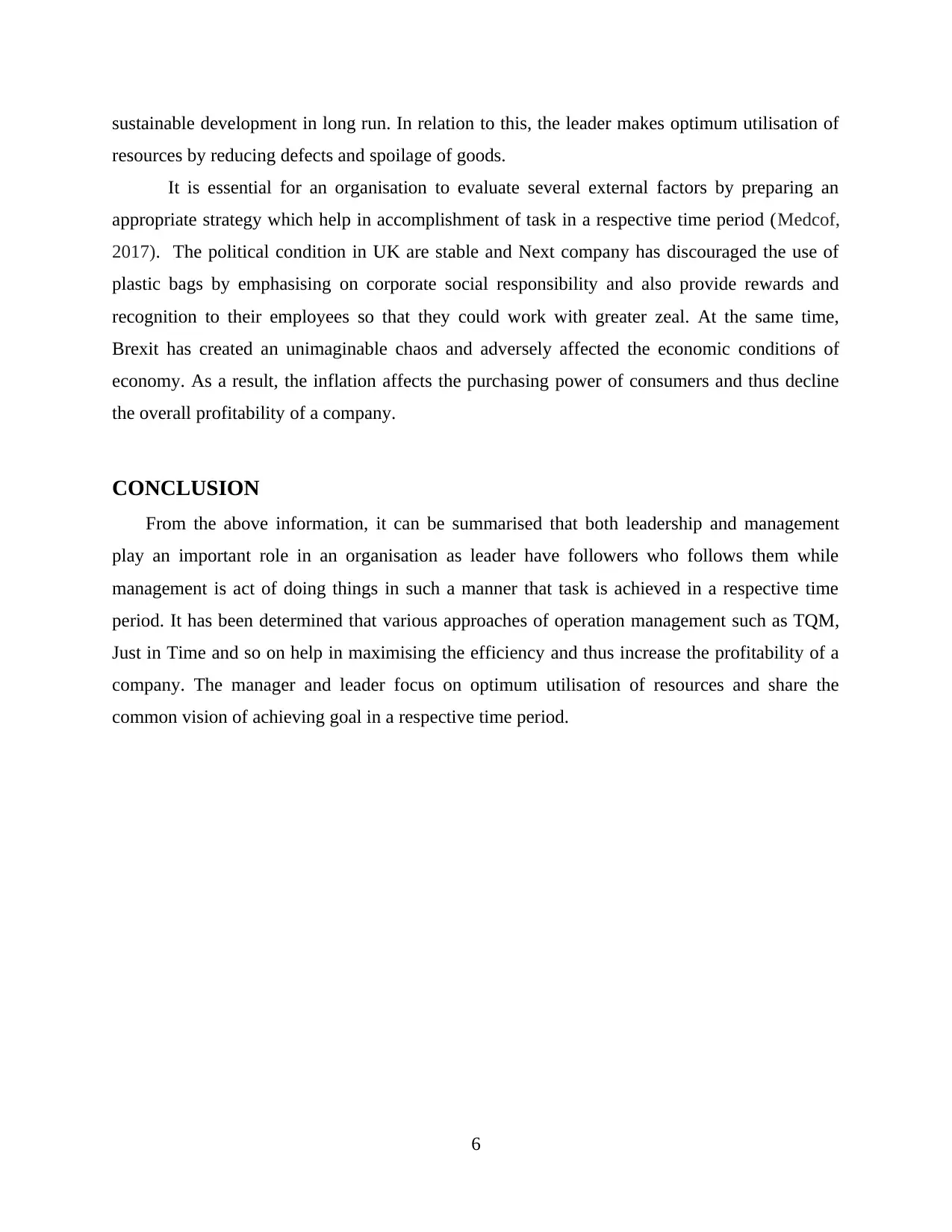
sustainable development in long run. In relation to this, the leader makes optimum utilisation of
resources by reducing defects and spoilage of goods.
It is essential for an organisation to evaluate several external factors by preparing an
appropriate strategy which help in accomplishment of task in a respective time period (Medcof,
2017). The political condition in UK are stable and Next company has discouraged the use of
plastic bags by emphasising on corporate social responsibility and also provide rewards and
recognition to their employees so that they could work with greater zeal. At the same time,
Brexit has created an unimaginable chaos and adversely affected the economic conditions of
economy. As a result, the inflation affects the purchasing power of consumers and thus decline
the overall profitability of a company.
CONCLUSION
From the above information, it can be summarised that both leadership and management
play an important role in an organisation as leader have followers who follows them while
management is act of doing things in such a manner that task is achieved in a respective time
period. It has been determined that various approaches of operation management such as TQM,
Just in Time and so on help in maximising the efficiency and thus increase the profitability of a
company. The manager and leader focus on optimum utilisation of resources and share the
common vision of achieving goal in a respective time period.
6
resources by reducing defects and spoilage of goods.
It is essential for an organisation to evaluate several external factors by preparing an
appropriate strategy which help in accomplishment of task in a respective time period (Medcof,
2017). The political condition in UK are stable and Next company has discouraged the use of
plastic bags by emphasising on corporate social responsibility and also provide rewards and
recognition to their employees so that they could work with greater zeal. At the same time,
Brexit has created an unimaginable chaos and adversely affected the economic conditions of
economy. As a result, the inflation affects the purchasing power of consumers and thus decline
the overall profitability of a company.
CONCLUSION
From the above information, it can be summarised that both leadership and management
play an important role in an organisation as leader have followers who follows them while
management is act of doing things in such a manner that task is achieved in a respective time
period. It has been determined that various approaches of operation management such as TQM,
Just in Time and so on help in maximising the efficiency and thus increase the profitability of a
company. The manager and leader focus on optimum utilisation of resources and share the
common vision of achieving goal in a respective time period.
6
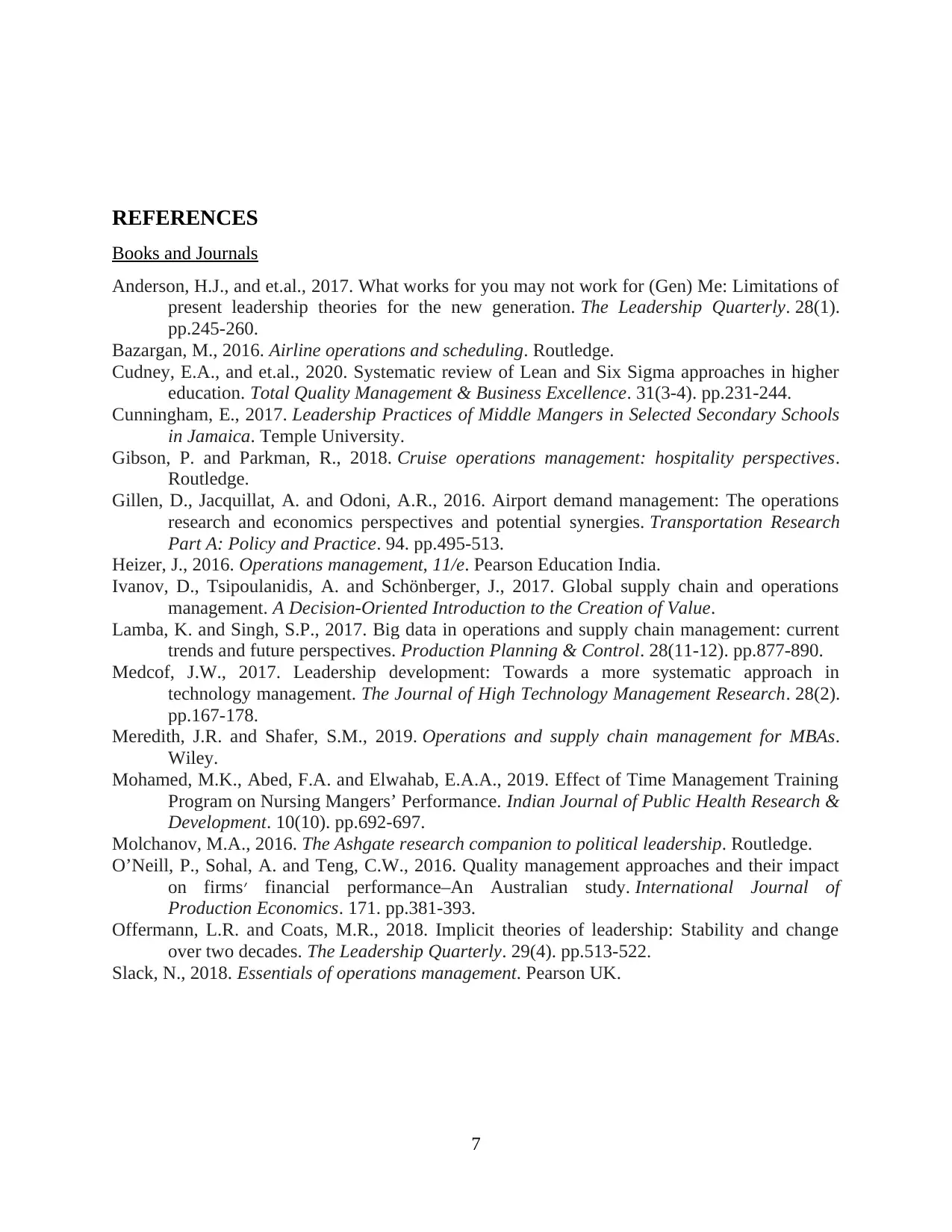
REFERENCES
Books and Journals
Anderson, H.J., and et.al., 2017. What works for you may not work for (Gen) Me: Limitations of
present leadership theories for the new generation. The Leadership Quarterly. 28(1).
pp.245-260.
Bazargan, M., 2016. Airline operations and scheduling. Routledge.
Cudney, E.A., and et.al., 2020. Systematic review of Lean and Six Sigma approaches in higher
education. Total Quality Management & Business Excellence. 31(3-4). pp.231-244.
Cunningham, E., 2017. Leadership Practices of Middle Mangers in Selected Secondary Schools
in Jamaica. Temple University.
Gibson, P. and Parkman, R., 2018. Cruise operations management: hospitality perspectives.
Routledge.
Gillen, D., Jacquillat, A. and Odoni, A.R., 2016. Airport demand management: The operations
research and economics perspectives and potential synergies. Transportation Research
Part A: Policy and Practice. 94. pp.495-513.
Heizer, J., 2016. Operations management, 11/e. Pearson Education India.
Ivanov, D., Tsipoulanidis, A. and Schönberger, J., 2017. Global supply chain and operations
management. A Decision-Oriented Introduction to the Creation of Value.
Lamba, K. and Singh, S.P., 2017. Big data in operations and supply chain management: current
trends and future perspectives. Production Planning & Control. 28(11-12). pp.877-890.
Medcof, J.W., 2017. Leadership development: Towards a more systematic approach in
technology management. The Journal of High Technology Management Research. 28(2).
pp.167-178.
Meredith, J.R. and Shafer, S.M., 2019. Operations and supply chain management for MBAs.
Wiley.
Mohamed, M.K., Abed, F.A. and Elwahab, E.A.A., 2019. Effect of Time Management Training
Program on Nursing Mangers’ Performance. Indian Journal of Public Health Research &
Development. 10(10). pp.692-697.
Molchanov, M.A., 2016. The Ashgate research companion to political leadership. Routledge.
O’Neill, P., Sohal, A. and Teng, C.W., 2016. Quality management approaches and their impact
on firms׳ financial performance–An Australian study. International Journal of
Production Economics. 171. pp.381-393.
Offermann, L.R. and Coats, M.R., 2018. Implicit theories of leadership: Stability and change
over two decades. The Leadership Quarterly. 29(4). pp.513-522.
Slack, N., 2018. Essentials of operations management. Pearson UK.
7
Books and Journals
Anderson, H.J., and et.al., 2017. What works for you may not work for (Gen) Me: Limitations of
present leadership theories for the new generation. The Leadership Quarterly. 28(1).
pp.245-260.
Bazargan, M., 2016. Airline operations and scheduling. Routledge.
Cudney, E.A., and et.al., 2020. Systematic review of Lean and Six Sigma approaches in higher
education. Total Quality Management & Business Excellence. 31(3-4). pp.231-244.
Cunningham, E., 2017. Leadership Practices of Middle Mangers in Selected Secondary Schools
in Jamaica. Temple University.
Gibson, P. and Parkman, R., 2018. Cruise operations management: hospitality perspectives.
Routledge.
Gillen, D., Jacquillat, A. and Odoni, A.R., 2016. Airport demand management: The operations
research and economics perspectives and potential synergies. Transportation Research
Part A: Policy and Practice. 94. pp.495-513.
Heizer, J., 2016. Operations management, 11/e. Pearson Education India.
Ivanov, D., Tsipoulanidis, A. and Schönberger, J., 2017. Global supply chain and operations
management. A Decision-Oriented Introduction to the Creation of Value.
Lamba, K. and Singh, S.P., 2017. Big data in operations and supply chain management: current
trends and future perspectives. Production Planning & Control. 28(11-12). pp.877-890.
Medcof, J.W., 2017. Leadership development: Towards a more systematic approach in
technology management. The Journal of High Technology Management Research. 28(2).
pp.167-178.
Meredith, J.R. and Shafer, S.M., 2019. Operations and supply chain management for MBAs.
Wiley.
Mohamed, M.K., Abed, F.A. and Elwahab, E.A.A., 2019. Effect of Time Management Training
Program on Nursing Mangers’ Performance. Indian Journal of Public Health Research &
Development. 10(10). pp.692-697.
Molchanov, M.A., 2016. The Ashgate research companion to political leadership. Routledge.
O’Neill, P., Sohal, A. and Teng, C.W., 2016. Quality management approaches and their impact
on firms׳ financial performance–An Australian study. International Journal of
Production Economics. 171. pp.381-393.
Offermann, L.R. and Coats, M.R., 2018. Implicit theories of leadership: Stability and change
over two decades. The Leadership Quarterly. 29(4). pp.513-522.
Slack, N., 2018. Essentials of operations management. Pearson UK.
7
⊘ This is a preview!⊘
Do you want full access?
Subscribe today to unlock all pages.

Trusted by 1+ million students worldwide
1 out of 9
Related Documents
Your All-in-One AI-Powered Toolkit for Academic Success.
+13062052269
info@desklib.com
Available 24*7 on WhatsApp / Email
![[object Object]](/_next/static/media/star-bottom.7253800d.svg)
Unlock your academic potential
Copyright © 2020–2026 A2Z Services. All Rights Reserved. Developed and managed by ZUCOL.





